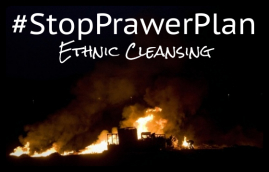Israel’s Siege of Gaza and Humanitarian Flotillas – Legal Background
 Factsheet by TheIMEU Nov 2, 2011
Factsheet by TheIMEU Nov 2, 2011
Follow @TheIMEU
1. Why is Israel’s siege of Gaza illegal under international law?
2. What about the Palmer Report?
3. Why does the international community continue to consider Israel an occupying power in Gaza?
5. Does Israel have the right to board the flotilla ships in international waters?
6. Can maritime blockades be imposed in international waters?
1. Why is Israel’s siege of Gaza illegal under international law?
As an occupying power that exercises effective control over Gaza, Israel has legal obligations to the residents of the occupied territory under the Fourth Geneva Convention, including the general duty to protect civilians under its control, and the specific duty to allow adequate access to food and medical supplies. Israel’s siege of Gaza, including its land and sea blockade, violates these duties of protection by denying Gazan Palestinian civilians’ access to adequate amounts of the most basic food and medical supplies, not to mention a host of other supplies necessary for rebuilding in the aftermath of Israel’s 2009 attack on the territory, which destroyed much of Gaza’s infrastructure.
Israel’s siege of Gaza, including its land and sea blockade, violates these duties of protection by denying Gazan Palestinian civilians access to adequate amounts of the most basic food and medical supplies, not to mention a host of other supplies necessary for rebuilding after the destruction wrought by Israel’s overwhelming destruction of Gaza’s infrastructure in its 2009 attacks. Israel’s violation of its duties, extensively documented by international organizations, ultimately amounts to the collective punishment of 1.5 million civilians, in violation of Article 33 of the Fourth Geneva Convention. The International Committee of the Red Cross, a UN fact-finding mission into Israel’s attack on the 2010 Gaza flotilla, and a UN panel of five independent Special Rapporteurs have all found the siege to be in violation of international law.
2. What about the Palmer Report?
In September 2011 a panel established by the UN Secretary General declared that Israel’s naval blockade was legal. However, the Palmer Committee Final Report included an important caveat stipulating that “its conclusions can not be considered definitive in either fact or law.”
Shortly after the Palmer Report was released, an independent panel of UN experts released their own report that deemed Israel’s blockade an act of collective punishment against the civilian population of Gaza, and a “flagrant contravention of international human rights and humanitarian law.” The experts added that, “In pronouncing itself on the legality of the naval blockade, the Palmer Report does not recognize the naval blockade as an integral part of Israel’s closure policy towards Gaza which has a disproportionate impact on the human rights of civilians.”
3. Why does the international community continue to consider Israel an occupying power in Gaza?
Israel’s claim that its occupation of Gaza ended with its 2005 withdrawal of troops and settlers from the Strip is an attempt to absolve itself of responsibility for Gazan civilians. Israel’s continued control of Gaza’s territorial waters, its airspace, the flow of people and goods through its land borders, and its continued ground and air incursions into the territory, verify that it exercises the “effective control” necessary to qualify as a foreign occupying power under the Fourth Geneva Convention. This has been acknowledged by the United Nations, the United States, Amnesty International, Human Rights Watch, and others.
Yes. Even if the Gaza Strip were not occupied, Israel would still be constrained by the principle of proportionality in imposing the blockade. This means that the military advantage gained must outweigh the harm caused the civilian population. This also means that the blockade may be no more restrictive than is necessary for military purposes. Yet the blockade is far broader, and its explicit aims are political, not military. It is therefore illegal, and actions taken to enforce it are similarly illegal.
5. Does Israel have the right to board the flotilla ships in international waters?
No. The principle of freedom of navigation is enshrined in international law, including in the Convention on the High Seas, the UN Convention on the Law of the Sea, and has attained the status of customary international law by which all states are bound. Under this principle, all states have the freedom to sail ships flying their flags on the high seas. Sovereignty over a ship is exclusive to the state whose flag the ship is flying. Any attempt to board the ship of another flag-state is therefore considered a breach of that state’s sovereignty. Israel’s boarding in international waters of previous humanitarian vessels to Gaza, or a boarding of the upcoming flotilla, are therefore violations of international law and would violate the sovereignty of the states to which the ships are flagged.
6. Can maritime blockades be imposed in international waters?
No. Contrary to Israel’s assertions, maritime blockades must be restricted to ports or coastal areas under the enemy’s control, and may not be imposed in international waters. Israel’s attempt to impose and enforce its blockade in international waters is therefore illegal. Israel’s claim that it has a right to pursue a ship intending to breach its blockade from the time it begins its voyage, based on the so-called doctrine of continuous voyage, is a minority position in international law. Israel’s reliance on this questionable doctrine does not justify its attack on previous or upcoming humanitarian flotillas.
![]()

Sign Petition → Support the Estelle Ship to Gaza
- Press Release | Estelle Flotilla to Gaza – Press Release (incl pressinfo)
- Follow Estelle | Check current position of the Estelle | Marine Traffic Live Map
- The Mavi Marmara Massacre | Full Report, Resources & Photos
- All related posts about this and current and previous Flotillas | Category Flotilla
- The Brutal Israeli blockade on Gaza | Arab News
Photo Galleries
Click on the thumbnails to view the full albums

 October 20, 2012
October 20, 2012 
















































Comments are closed.